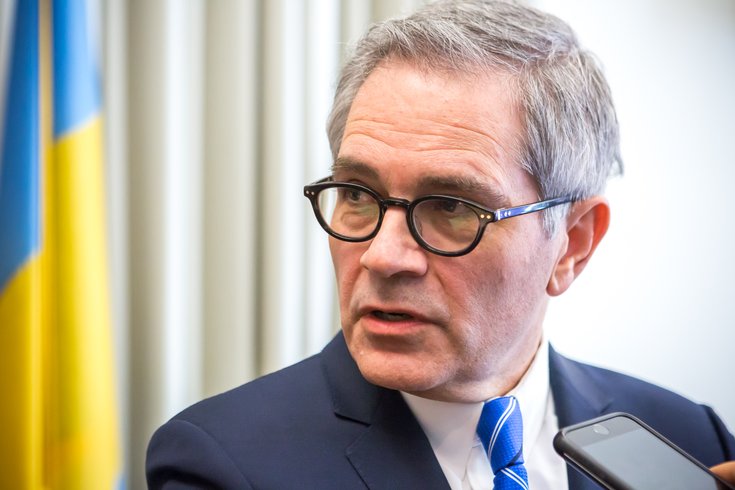
June 25, 2018
 Thom Carroll/PhillyVoice
Thom Carroll/PhillyVoice
Philadelphia District Attorney Larry Krasner.
Facing heavy criticism from members of the police union, Philadelphia District Attorney Larry Krasner on Monday defended his office's choice not to pursue the death penalty in the 2015 shooting death of Philadelphia Police Sgt. Robert Wilson III.
The highly publicized case came to a close Monday morning when brothers Carlton Hipps and Ramone Williams accepted a plea deal that will keep them behind bars for the rest of their lives.
Wilson, an eight-year veteran of the force, was killed on March 5, 2015 when he entered a GameStop store in North Philadelphia to buy a gift for his son's tenth birthday.
The father of two was slain while protecting the store manager and other customers when the gunmen opened fire during an attempted robbery.
The 30-year-old officer was shot multiple times, including fatal wounds to the head and back. He was posthumously awarded the Medal of Valor by former President Barack Obama and was memorialized with a sidewalk plaque in North Philadelphia near 17th and Montgomery streets.
Krasner, whose progressive campaign vowed to eschew capital punishment, informed Wilson's sister and grandmother of the plea deal last Friday.
The Philadelphia Fraternal Order of Police Lodge 5 then attacked Krasner's decision, urging officers to appear at court Monday morning on behalf of Wilson's family.
Come out and show support this Monday at 9am room 907 Criminal justice center to Support the Wilson family. #powerinnumbers. #thinblueline pic.twitter.com/bEn3HfZW5K
— FOPLodge5 (@FOPLodge5) June 23, 2018
At a press conference on Monday afternoon, Krasner addressed questions surrounding the case and claimed the narrative around the plea deal was misguided and inaccurate.
"Family members -- the children of Sgt. Wilson and their parents -- do not want the death penalty," Krasner said.
"I know the narrative around this has been that the family somehow is only represented by the grandmother and sister, but that's not true," he continued. "The reality is that this is a family that is split on this issue."
Krasner said he personally visited Wilson's grandmother and sister to receive their input on the case in advance of the plea deal. He said they were given more attention than victims historically receive from the district attorney's office.
"Our heart aches for the entire Wilson family, whether it's the mothers of the children, the grandmother or the sister. This is an unbelievable and unspeakable tragedy." - Mike Neilon, Philadelphia Fraternal Order of Police Lodge 5
As the closest kin, the mothers of Wilson's children were given priority in consideration of the case, Krasner said.
The goal was to protect the anonymity of Wilson's children, shield them from repeated trauma over years of anticipated appeals and prevent the intimidation, harassment and abuse of their mothers as the case proceeded.
"As much as I respect what [the sister and grandmother] have to say, when people don't get the result they're hoping for, they often are dissatisfied with whoever made the decision," Krasner said. "I'm not going to, in any way, make their situation worse. They are dealing with a level of pain that is frankly unimaginable to most of us."
Wilson's friends and family members were joined in court Monday morning by more than 10 police officers, some of whom were witnesses at the scene of the shooting.
The mothers of Wilson's children were not present as his grandmother and sister expressed their disappointment in Krasner's decision.
"We don't want to create a wedge between the families," said Mike Neilon, a spokesman for the Philadelphia FOP. "Everyone has an opinion on the death penalty. Today was the first time the question of intimidation even came up.
"Our heart aches for the entire Wilson family, whether it's the mothers of the children, the grandmother or the sister. This is an unbelievable and unspeakable tragedy."
Neilon claimed that Wilson's family was most upset by the way Krasner handled last week's outreach and his choice not to pursue the death penalty.
Krasner said Monday that his office acted appropriately on a timeline driven by necessity.
The decision was consistent with his office's analysis of the heavy costs associated with death-penalty cases. Those resources would be better spent on police and other forms of crime prevention, he argued.
"A choice to waste money may be a choice to endanger police officers," Krasner said. "And frankly, if you really want to get down to it, when did the death penalty prevent this outcome?
"The death penalty has not stopped it here. The death penalty has not stopped it in the past. And, every bit of scientific evidence indicates that it's not going to stop it in the future."
Monday's plea deal came just as Pennsylvania's Joint State Government Commission released a report with multiple recommendations regarding the death penalty.
The bipartisan commission called for an exemption for those with severe mental illness, the establishment of a state capital defenders office and further study on racial bias in the use of the death penalty.
"The reality is that the outcome under Lynne Abraham, who said that she was passionate about the death penalty, was no different than this." --Larry Krasner
Pennsylvania Governor Tom Wolf declared a moratorium on the death penalty three years ago pending the completion of the report released on Monday.
Under Krasner, Philadelphia appears likely to reverse course from the hardline approach of longtime former District Attorney Lynne Abraham, who obtained 108 death sentences while in office and became known as one of America's deadliest prosecutors.
Despite Abraham's reputation, Krasner said his decision followed precedent in Philadelphia police officer shootings over the past 20 years.
Only one person charged with killing a police officer ultimately ended up on death row during that period, which included 15 defendants and 11 police officers who died in the line of fire.
"The reality is that the outcome under Lynne Abraham, who said that she was passionate about the death penalty, was no different than this," Krasner said.